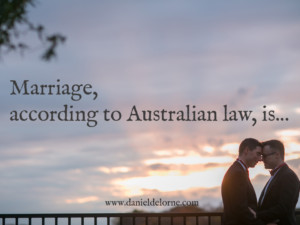 On the same day that the Australian House of Representatives voted to proceed with legislation for a plebiscite on same-sex marriage, we attended the wedding of friends in Geelong. I don’t know if you’ve been to an Australian wedding, but as part of the legal proceedings, the following words must be spoken:
On the same day that the Australian House of Representatives voted to proceed with legislation for a plebiscite on same-sex marriage, we attended the wedding of friends in Geelong. I don’t know if you’ve been to an Australian wedding, but as part of the legal proceedings, the following words must be spoken:
“Marriage, according to law in Australia, is the union of a man and a woman to the exclusion of all others, voluntarily entered into for life.”
It’s a part of the ceremony that my husband and I (we married in Canada two years ago. Thanks Canada) brace ourselves for. Then-Prime Minister John Howard introduced the wording in 2004 as part of changes to the Marriage Act. A change that did not go to a plebiscite or any other vote other than the one in parliament.
How to handle the marriage definition
We’ve been to Australian weddings since where, thankfully, there has been a visible cringe when hearing these words spoken, especially considering who’s in the audience.
At one wedding, the bride and groom chose to nullify it with signs held up at opportune moments. They bore asterisks or ‘what a load of crap’ written on them. It was a light-hearted way of dealing with it.
At another, there was no realisation of what those words might actually mean to anyone who wasn’t heterosexual. Afterwards the bride was deeply apologetic to us and possibly more upset by it than us.
Not that someone else’s wedding was about us, and nor would we want it to be. However, I find some comfort in knowing that others now realise how hurtful that legal definition is.
At the wedding in Geelong, as The Words came nearer, I braced myself but I needn’t have bothered. I’m not one to normally cry at weddings but what the bridge and groom included in their ceremony had me choked up.
After The Words were spoken, the celebrant continued on:
“
[The couple] would like to acknowledge that they believe ANY strong, loving and healthy relationship deserves to be recognised and celebrated. It is not so much whom you love, but rather how you nurture and treasure that love which is important. They look forward to the day when all couples have the opportunity and choice to marry in Australia regardless of gender.”I was touched, honoured and so pleased to have friends like this in my life, friends who recognise that the law has not kept up, that it hurts people. I’ll admit, those generous words hit home a lot more than I expected.
There’s still some way to go
The plebiscite legislation is heading towards the Senate where it is almost assured defeat. The steam will likely go out of the issue. It will burble along in the background for three more years unless there’s a change of heart, will or government.
I am not for the plebiscite. We didn’t have one to change the Marriage Act in 2004, we don’t need one now.
And I am not at all pleased that my human rights are used as a political football, or seen as negotiable.
Nevertheless, I remain optimistic that one day it will change and change for the better. Australia’s always been about ten years behind.
In the meantime, I’ll take comfort from the fact that there are countries in the world that respect my marriage.
How have you handled the marriage definition in your wedding ceremony?

Leave a Reply